AABS is pleased to bring you a recap of the 20th Conference of AABS’s Australasian Chapter, held on 8 October 2022 in Melbourne, Australia, at RMIT University. The conference broke new ground by incorporating significant virtual participation to build on its decades-long history of meetings and strong base of individual scholars.
Dr. Luda Popenhagen, Professor Emerita, California State University, Channel Islands, attended the conference and wrote the following recap, which has been lightly edited. She has kindly agreed to us publishing it for all to see. Thank you, Luda!
The twentieth conference of the Association for the Advancement of Baltic Studies (AABS) Australian Chapter took place on October 8 at the Royal Melbourne Institute of Technology (RMIT). The committee of the AABS Australian Chapter consists of Dr. Delaney Skerrett, Chairman, Associate Professor Uldis Ozoliņš, Treasurer, and Dr. Ted Reilly, Secretary. The theme of the conference, “The Baltic Countries in a Changing World,” attracted speakers from Australian and European universities, as well as from the embassies of Estonia, Latvia, and Lithuania located in Canberra, Australia.
Dr. Skerrett welcomed everyone to the first hybrid AABS conference in Australia. Estonian, Latvian, and Lithuanian ambassadors and counsellors based in Canberra held an online roundtable discussion moderated by Assoc. Prof. Uldis Ozoliņš. The Q and A dealt with each Baltic country’s association with Ukraine during the current war.
Counsellor Ms. Merike Grűnthal, Deputy Head of Mission, Estonian Embassy, stated that the war in Ukraine is not a surprise for Estonia, and that Estonia unreservedly supports Ukraine. The recent Russian cyber-attacks on Estonia were not effective. Counsellor Grűnthal continued saying that like-minded countries with the Ukrainian cause, such as Australia, need to sustain their provision of weapons, financial aid, and moral support. To Assoc. Prof. Ozoliņš’s question about Russia wanting to reclaim Narva, Estonia, Counsellor Grűnthal replied that Sweden was also looking at Narva, and that the Russian community was not united; the younger Russians in Estonia felt Estonian rather than Russian.
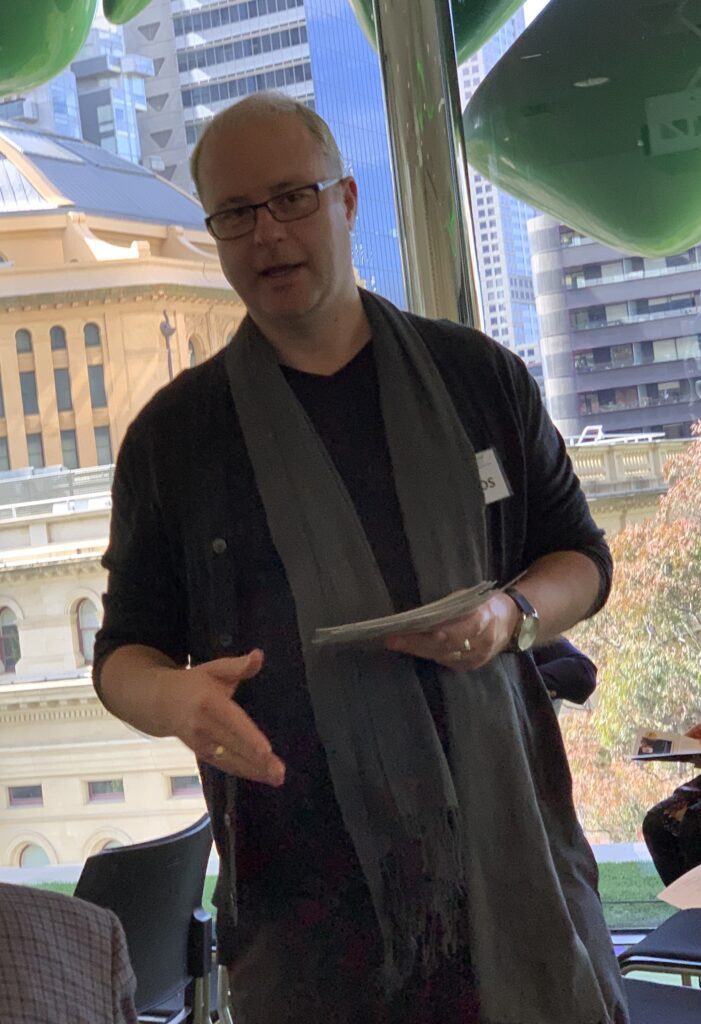
Delaney Skerrett
His Excellency Mr. Marģers Krams, Ambassador of Latvia, asserted that Latvia has cancelled visas for Russians wanting to travel to Latvia, and that Latvia was calling on European Union leaders to stop all tourist visas for Russians. In response to Assoc. Prof. Ozoliņš’s question about the destruction by Latvians of the monument at Daugavpils, Ambassador Krams stated that President Vladimir Putin wants to restore the Russian Empire. The destruction of the Daugavpils monument, which symbolized the Red Army and the Soviet regime, was significant because there was no longer a place in Latvia for such reminders of a past era.
His Excellency Mr. Darius Degutis, Ambassador of Lithuania, explained that the Baltics, who grew up in the Soviet system, know the Russian mentality, and the Baltics had warned the European Union about the dangers posed by the Kremlin. Ambassador Degutis went on to explain that Russia is losing the war in Ukraine and that the Kremlin’s threats to use nuclear weapons would be a disaster for Russia. The NATO summit will be held in Vilnius in 2023. When the moderator, Assoc. Prof. Ozoliņš, asked about Lithuania’s support for Taiwan, Ambassador Degutis gave an example when Iceland supported Lithuania in 1990: a small country can attract a lot of international attention. In response to a question from the audience asking if Nazi and Soviet crimes in Lithuania were comparable during and after WWII, Ambassador Degutis replied that Nazis killed 10% of Lithuanians, and the Soviets also annihilated 10% of the Lithuanian population.
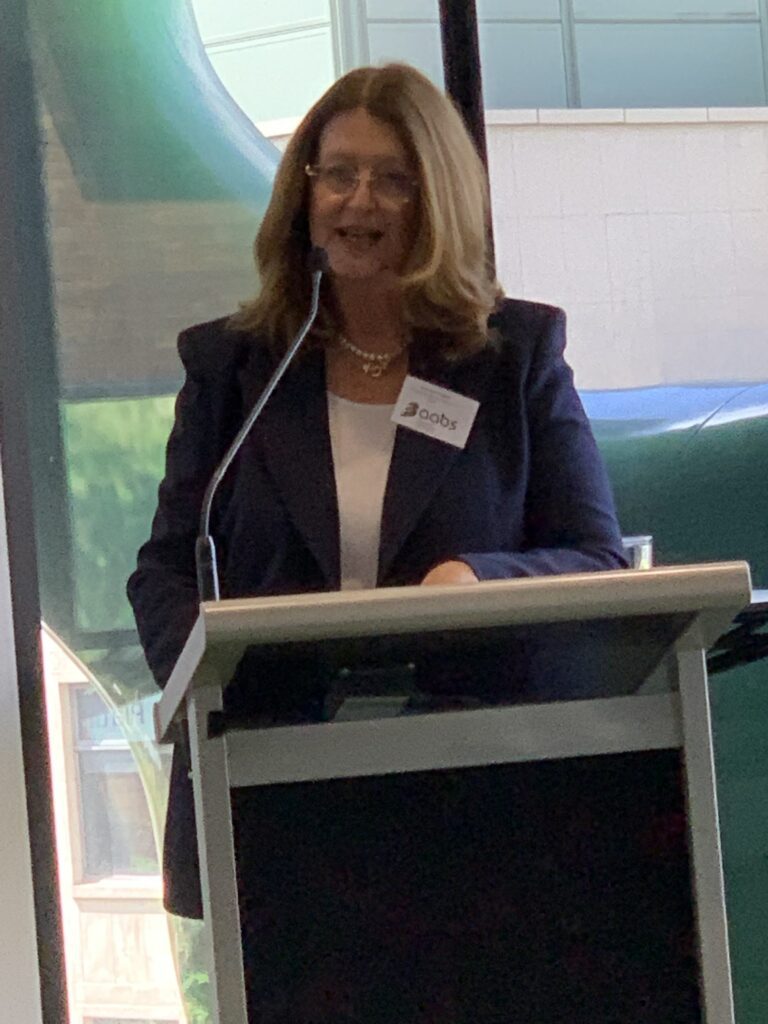
Anu van Hattem
Speakers representing universities from Brisbane, Canberra, Geelong, Melbourne, Perth, Sydney, Debrecen (Hungary) and Warsaw discussed past and present events in the Baltics. They examined Baltic literature, linguistics, civil society and forced migration, history and art, politics, sociology, and introduced their newly written books. Some speakers were in the conference room, while others presented online and were projected onto a screen for the audience to see.
Ms. Anu van Hattem, Honorary Consul for Estonia in Western Australia, discussed “Monuments & Memorials: Remain, Rename or Remove?” Her paper examined the changing attitudes of the Baltic states toward the removal of Soviet era monuments after the Russian invasion of Ukraine on February 24, 2022. Ms. van Hattem described the controversy surrounding the removal of a replica of a Soviet-era tank located in the eastern city of Narva, close to the Estonian-Russian border. In Riga, a concrete obelisk decorated with Soviet stars commemorating the Red Army’s victory over Nazi Germany was taken down. In Vilnius, vehement discussions have surrounded the removal of four Soviet statues on the Green Bridge (Žalias tiltas) since the mid-1990s. The younger generations were not problematized by the relics of an oppressive past; however, the best places for these memorials of the past may be museums.
Dr. Ron Popenhagen, California State University, discussed “Eastern Landscapes: Contemporary Perspectives on Baltic Modernism” after seeing the visual arts exhibition “Wild Souls” in Paris four years ago. The exhibition featured the works of Estonian, Latvian, and Lithuanian modernist visual artists who worked in the late 19th century and early 20th century. Dr. Popenhagen pointed out that Baltic painters were rarely recognized in other parts of Europe, even though they made a unique contribution to European modernism. He showed slides of paintings of landscapes and portraits by Baltic artists. The landscapes contained images where each painter unequivocally depicted an impression of reality or an abstraction of it, for example, in the landscapes of Triik, Rozentäls, and Čiurlionis. The portraits reminded the viewer of the value of the natural world and the worthlessness of worldly goods as enacted in a memento mori, for example, Tarabildienė’s self-portrait with a skull, called Vanitas. Dr. Popenhagen’s book Modernist Disguise: Masquerade in Modern Performance and Visual Culture, published by Edinburgh University Press, 2021, explores issues of modernism through painting, masquerade, and performance.
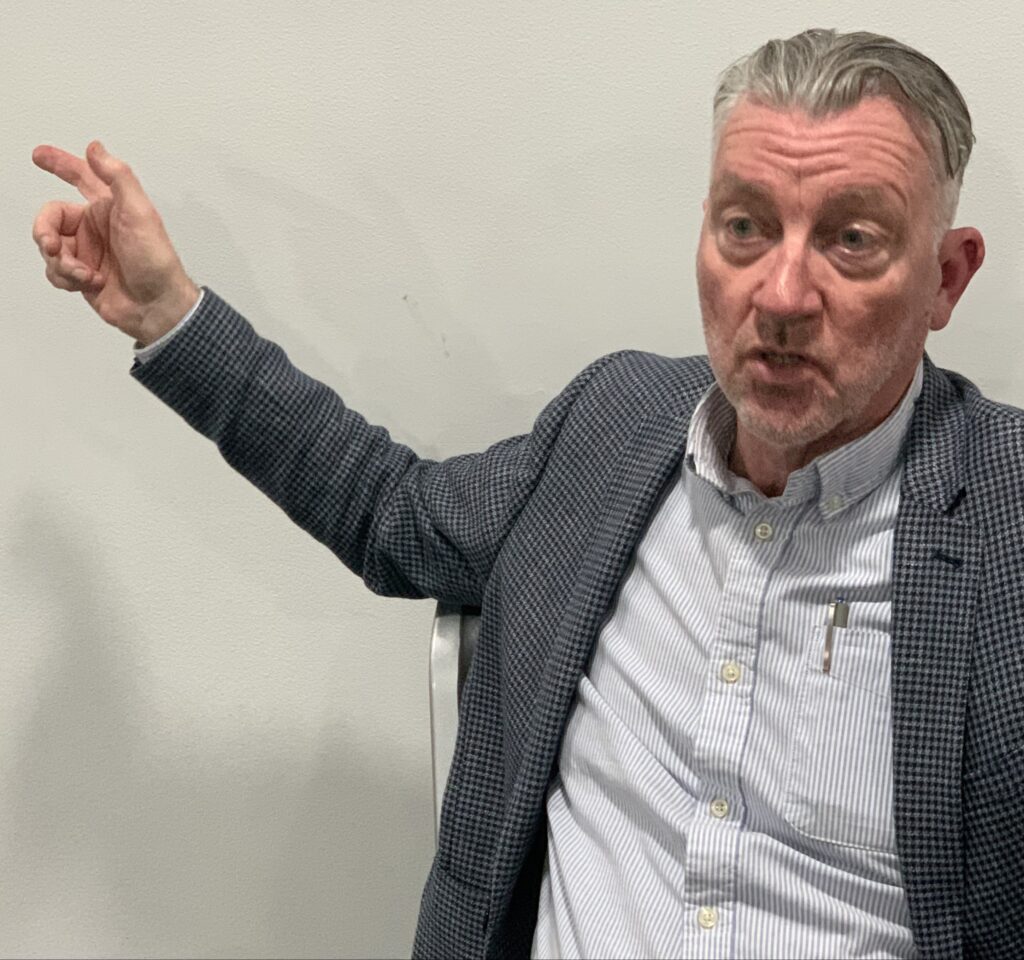
Ron Popenhagen
Dr. Elena Govor and Dr. Hillary Howes, both of Australian National University, presented their paper “‘National Physiognomies,’ ‘National Skulls’ and Baltic Germans between West and East.” The paper outlined the involvement of Karl Ernst von Baer, Baltic German anatomist and embryologist, and J. M. Heuser, Baltic German sculptor, in creating replicas of “some of the national skulls” in the collection of the Imperial Academy of Sciences in St. Petersburg, 1865. Dr. Govor and Dr. Howes’ paper provides insights on the construction of racial identities by building connections between geographically distant museum collections in the 19th century Russian Empire and museum collections in the wider world.
“Civilian-Based Resistance in the Baltic States: Lessons for Today” by Ms. Marta Kepe, RAND Corporation, examined how civilian-based engagement in the Baltic States and elsewhere can play a role in the national defence effort, as is now happening in Ukraine. The civilian-based resistance is expressed through language, culture (e.g., folksongs, tales, festivals), and/or direct confrontation. This was the key catalyst in the Baltic States in the 1980s, and which Soviet-control was not successful in oppressing. Today the Baltics model themselves on Sweden, Finland, and Switzerland, where civilian-based resistance has increased public awareness of various causes and impacted crisis management.
In his paper, “‘Kangaroo Plus Russian Bear Equals Whitlam’: Baltic Protestors and Australia’s Recognition of the Soviet Baltic States,” Mr. Jesse Seeberg-Gordon, University of Melbourne, investigated the late Australian Prime Minister Gough Whitlam’s decision in 1974 to recognise de jure the 1940 Soviet annexation of the Baltic States. The Baltic diaspora protested this action vehemently in Australia, Canada, and the USA. Mr. Seeberg-Gordon provided previously unknown archival materials to confirm that the protest movements were vital for the subsequent government under Prime Minister Malcolm Fraser to reverse Whitlam’s recognition, after the latter was unseated in 1975.
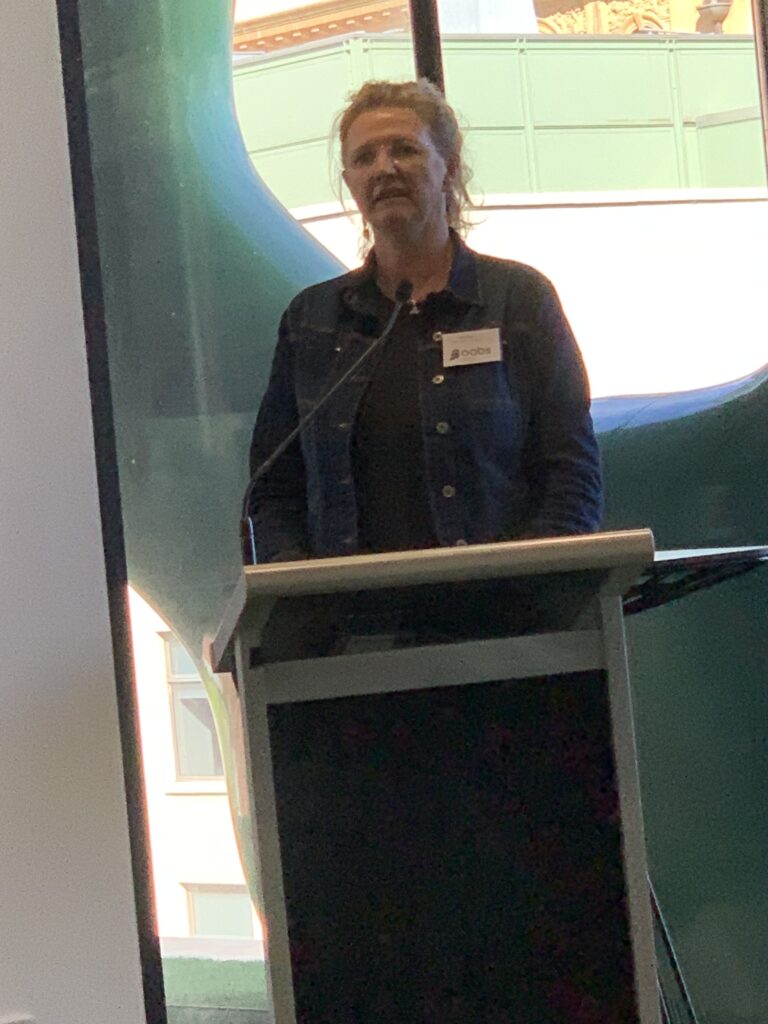
Anita Kazis
Ms. Anita Kazis, independent scholar, presented her paper entitled “Disputed Territories of Russia, the Baltics and Beyond.” After Russia’s invasion of Ukraine and occupation of Crimea, Ms. Kazis described the Karelia region between Finland and Russia, the Krievijas area between Estonia and Latvia annexed by Russia in 1945, the Abrene district formerly part of the Latvian Republic but currently claimed by the Russian Federation, and the oblast of Kaliningrad between Poland and Lithuania. Ms. Kazis outlined how Russia operates politically in usurping territories, and noted how these types of territorial claims are practised by other countries such as China.
Dr. Delaney Michael Skerrett, Australian National University, Australian College of Natural Medicine, and Honorary Consul of Estonia in Brisbane, introduced his paper titled “The Stamp of a Nation: A Comparison of the (Re)Creation of National Identity through Postage Stamps in Estonia and Australia.” He considered national identity through the comparison of postage stamps from Estonia and Australia. Dr. Skerrett’s study provided a postmodernist perspective on national identity; he proposed a content analysis of major themes that are (re)created and (re)constructed through symbols in Estonian and Australian stamps. Australia’s identity or identities as a multicultural nation are significantly different in nature to Estonia’s identity, which focused greatly on one ethnicity. These differences were evidenced via topics and themes selected by the respective national postal administrations.
In “Latvian Elections October 1, 2022,” Associate Professor Uldis Ozoliņš, University of Western Sydney, considered the consequences and looming issues of these recent elections in the shadow of Russia’s war in Ukraine. The paper analysed the outcomes in the wake of the war in Ukraine based on the degree to which the result reflected national security, the fate of the parties of the Russian-speaking populations in Latvia, and the electoral fate of “saviour” parties. In conclusion, Assoc. Prof. Ozoliņš asked, ‘How will the Russian-oriented parties recover, and how will Latvian culture evolve?’
Dr. Sándor Földvári, Debrecen University, presented his paper, “Does the Finno-Ugric Origin of the Three Locatives in Old Lithuanian Prove the Existence of a Circum-Baltic Linguistic Area (Sprachbund)?” His research is based on the Lithuanian noun case Locativus and the potential of it being the contemporary descendant of the Illativus, Allativus, and Adessivus cases after they evolved as a result of the impact of neighbouring Finno-Ugric languages. The examples provided by Dr. Földvári were compiled by Alfred E. Senn using the 16th century compilation created by Lithuanian Konstantinas Sirvydas writing in Latin, Lithuanian, and Polish. Dr. Földvári concluded that seemingly unrelated languages could be connected based on past language forms.
Dr. Katažyna Berštanska, University of Warsaw, presented “Ukraine and Russia as the ‘Other’ in Lithuanian Foreign Policy after 1991.” This article focused on the motif “Ukraine and Russia as Others” in the official discourse on foreign policy in Lithuania. The analysis of this discourse gave the reader insight into the dynamics of the self-identification process of Lithuania over the last 30 years. In her research, Dr. Berštanska reconstructed ideas about Ukraine and Russia formed by Lithuanian presidents. From her study, she concluded that the more Russia was aggressive, the more Ukraine was defined as the positive “Other” in Lithuanian discourse on foreign policy.
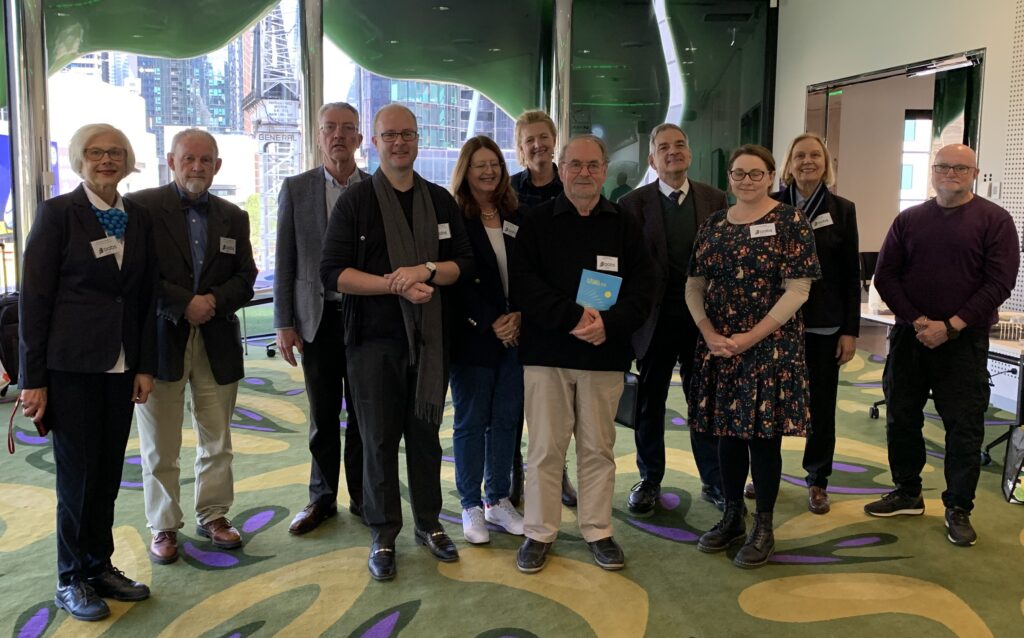
Conference attendees
Two speakers presented their books centred on memories. Dr. Gražina Pranauskas, University of Melbourne, introduced Soviet Fairytales, published by Australian Scientific Publishing, 2019, a collection of fourteen short stories and recollections from her youth in Lithuania, where she grew up under the Soviet system before migrating to Australia. Dr. Pranauskas was not a member of the Communist Party, but she remembered, for example, wearing pioneer uniforms and learning their songs. She provided examples from her own experiences and stories from others who had no notion of the Soviet-era restrictions. Dr. Pranauskas noted that her book was especially informative for younger Estonians, Latvians, and Lithuanians who did not experience the Soviet regime.
The second book was presented by Dr. Eve Puodžiūnaitė Wicks, Griffith University, author of In Sunshine and Shadow, Reflections on Lithuanian Immigrant Life, published in 2018. The book delves into the experiences of Brisbane’s Lithuanian emigrants between the World Wars and after the Second World War. It is originally in both English and Lithuanian and was translated by Gintautas Kaminskas. It includes accounts of memories, photos, poetry, and short stories about the homeland and occurrences in a newly adopted country. The book project began in 2001 after researching three migrants. From there photography studies and investigations grew, resulting in a four-month exhibition at the Queensland Museum in 2005; Sun and Shadow, created in 2018, was part of Dr. Wicks’s doctoral work. The book is a recovery of historical and contemporary voices of the Australian Lithuanian community in Brisbane.
The literary magazine Azuria #10 was presented by Dr. Ted Reilly, independent scholar. This year the theme of the magazine was “Peace and War” and contains a collection of poetry, short stories, and images. Authors from America, Australia, Canada, Greece, Georgia, Latvia, Lithuania, and Ukraine write in English, German, Greek, Georgian, Latvian, Lithuanian, and Ukrainian. This publication was funded by Geelong Writers Inc. and the Estonian Cultural Foundation in Australia. Dr. Reilly will describe Azuria in greater detail at the Literature and Song Afternoon during the Australian Lithuanian Days festivities in Sydney, December 2022.
Informal discussions continued into the evening ending with a dinner attended by many conference participants. Organizers, presenters, and audience members regarded the twentieth conference of the AABS Australian Chapter at RMIT a great success.
